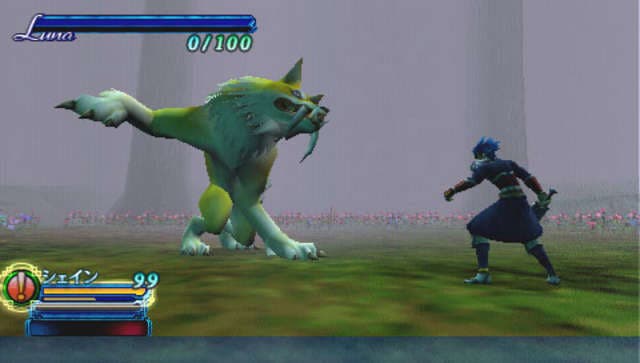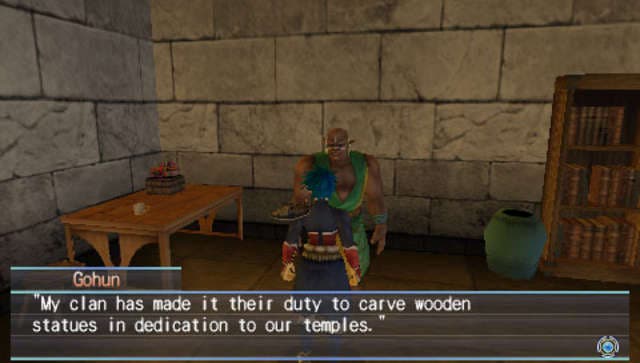Blade Dancer: Lineage of Light
Lord of the Prance.
There's a certain leap of logic which a lot of people - ourselves at Eurogamer included - made about the PSP when it was launched. Here, in essence, is a handheld PlayStation 2, with a disc format capable of holding far more data than any portable game format has previously managed. The PlayStation and PlayStation 2 have been the spiritual home of the Japanese RPG genre for over a decade; therefore, surely it would stand to reason that the PSP should continue this tradition, attracting RPG developers to weave their tales on Sony's ultra-powerful black slab of technology?
For whatever reason this hasn't happened. Maybe it's something to do with the hardware, maybe it's the vastly larger sales figures of the DS in Japan, maybe it's just that such games are taking a while to show up. The PSP certainly has a scattering of decent JRPGs, but it's hardly a raging torrent of high quality stories about spiky-haired heroes. Perhaps even more significantly, the real juggernauts of the genre, the Final Fantasies and Dragon Quests, remain eerily absent so far. As a consequence of their absence, less well known titles take centre stage on the PSP, the latest of which is Blade Dancer: Lineage of Light, a decent if uninspired stab at the RPG genre from Japanese studio Hitmaker.

No Cliché Left Unturned
Right. Stop me if you've heard this one before: Long ago, the world was home to an advanced civilisation who built a fantastic society, but which was threatened when an unpleasant Dark Lord chap decided to take over. Only one chosen hero could fight against him, and was unfortunately dubbed the "Blade Dancer", and even though he disappeared mysteriously one day, the reign of the Dark Lord chap was brought to an end. To this day, nobody knows where the Blade Dancer is... DRAMATIC PAUSE. Now a young man sporting a very similar tattoo to the legendary Blade Dancer is on his way to the mysterious island of Foo (yes, "Foo" - they were scraping the bottom of the barrel so damn hard that they came up with splinters on that one) to seek adventure and test his skills as a warrior.
That would be you, then. And while your over-enthusiastic lead character may be a spiky-haired, annoying, prancing bloody cliché on legs, at least he's not just washed up on a beach without any memories about his Dark and Mysterious Past. Small mercies. Unfortunately, the rest of the storyline is as hackneyed as any we've come across recently, with every "twist" being as predictable as the last, and the characters themselves poorly developed and paper thin. It's not offensive or awful, just a bit dull and sub-par; but in a genre which many players relish as much as interactive novels as as games, that's a dangerous black mark to have on your scorecard.

Thankfully, Blade Dancer does redeem itself significantly in a number of other departments, most notably the combat. It's an interesting and intense combination of real-time and turn-based elements which sees each character in a battle gradually filling up a meter until they have an action available. You need to select characters with available actions and get them to do something useful, and the game never pauses while you're engaged in this.
As you carry out actions, a Luna gauge on screen fills up, and this allows you to use special "Lunabilities" which are basically magical or healing attacks. Luna is, in effect, Blade Dancer's answer to conventional MP, but with the twist of being a resource which replenishes in each battle. Even more uniquely, it acts as a single resource pool from which both you and your enemies can draw; as the gauge fills up, enemy characters can also suck points from it to chuck more powerful attacks your way. It's surprisingly easy to get your backside handed to you if you don't take swift action to stun or otherwise incapacitate any enemy who starts using a Lunability. This is a great system, which really encourages tactical, thoughtful play and above all, fast responses - not usually a mainstay of RPG battle systems, but quite welcome as an interesting tweak to the genre.
Crafty Devil

Another side-effect of the Luna gauge system is that you'll be able to wander around battling and exploring for long periods of time without having to pop back into a town to refuel or rest. In the field, enemies are represented by differently coloured skulls, depending on how powerful they are; one peculiarity being that enemies far below your level will try to run away from you. Avoiding combat isn't a good plan, though, since if they escape, they may well gather some pals and come back to smack you around in a much more powerful form shortly afterwards. The fact that avoiding them is possible at all is great, though, given our well-documented dislike of the archaic random battle system still found in many RPGs.
If the combat is one of the headline Good Things about Blade Dancer, then the crafting system is the other. The actual process of crafting useful items from the rubbish you pick up around the world is very simple, and basically allows you to craft things from almost everything in the game. All you have to do is combine them in the right proportions to make something, basing your recipe either on specific recipes you have acquired or on pure trial and error. Basic stock items such as health potions, for example, can be made out of stuff you find as you progress, and you'll also discover that making your own weapons is an equally essential part of the game, because once they're worn out they cannot be repaired.

You can stop and craft at any point in the game, even in the middle of dungeon areas, although it's a fine plan to get out of the way of any monsters first (we were rather taken aback to be attacked by some nasties when we first started making our own gear, having assumed that the game would politely pause for us). Again, this contributes to the rather nice ability to plunge through the game without having to back-track much, and since you're making your own stuff from items you find, you'll rarely if ever find yourself in the position of having to run back to a town to go shopping. Each of your characters has a specific alignment which makes them more proficient in manufacturing certain item types, which add a minor amount of complexity to the system, but overall it remains transparent, simple, and fun.
That's really Blade Dancer in a nutshell: a decent combat system and an interesting crafting mechanic, but in terms of the rest of the game, Hitmaker doesn't really cut it. Whether it's the hackneyed story, the clichéd and mediocre graphics or the uninspired, thinly spread music, it doesn't feel like the developer tried very hard. Ultimately, without a solid yarn to tie the whole thing together and make the player actually want to follow these characters through their 20-odd hour quest, Blade Dancer struggles to make itself worthy of a truly enthusiastic recommendation.

